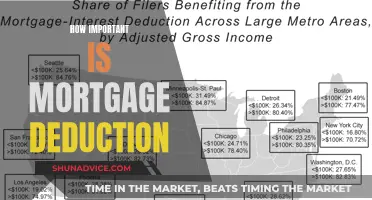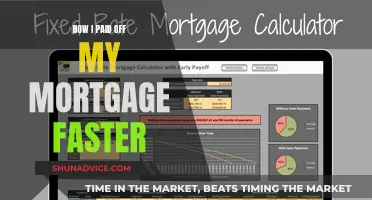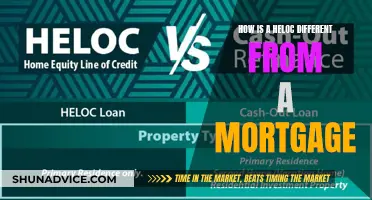
Islamic mortgages are an alternative to traditional mortgages, allowing Muslims to buy homes in a way that aligns with their religious beliefs. Traditional mortgages are considered haram (forbidden) under Islamic law because they involve interest, which is seen as exploitative. Islamic mortgages, also known as halal mortgages, are Sharia-compliant and function as no-interest home purchase plans. While there are several variations, they generally involve the bank buying the property and either charging rent until the borrower can buy it or selling it back to them at a higher price.
| Characteristics | Values |
|---|---|
| Nature of the loan | Islamic home financing is not a mortgage loan but a home purchase plan (HPP) or a lease agreement. |
| Interest charged | No interest is charged on the loan. |
| Nature of the agreement | The bank buys the property on behalf of the borrower and becomes the legal owner. |
| Monthly payments | Monthly payments are made in the form of rent, with a portion going towards buying out the property owner's stake. |
| Deposit | The deposit typically ranges from 5% to 35% depending on the lender. |
| Term | The term is similar to the length of a mortgage term, i.e., around 25 years. |
| Profit | The bank makes a profit by selling the property to the borrower at a higher price. |
| Compliance | Islamic mortgages are compliant with Shariah law and the rules of Islam. |
| Affordability | Islamic mortgages can be more expensive due to a smaller pool of providers and higher deposits. |
| Risk | The bank and borrower share the risk and the return on the property. |
What You'll Learn

Islamic mortgages are interest-free
Islamic mortgages are not actually mortgages at all, but home purchase plans (HPPs). They function as no-interest agreements, where the bank buys the property on the buyer's behalf and becomes the legal owner. The buyer then makes monthly payments in the form of rent, with a portion of the money going towards buying out the property owner. This is known as Ijara (leasing).
Another option is Diminishing Musharaka (shared ownership), where the bank and the buyer own separate shares of the property. Each repayment includes capital and rent, so the buyer's share grows over time, and the bank's share diminishes. The buyer's rent reduces as their share of the property increases.
The third type of Islamic mortgage is Murabaha (resale financing). In this scenario, the bank buys the property and sells it back to the buyer at a higher price. The buyer pays in instalments, but there is no interest involved.
Islamic mortgages are available from a variety of providers and are regulated by the Financial Conduct Authority (FCA). This means that customers are protected, just as they would be with an interest-charging mortgage. However, Islamic mortgages can be more expensive due to higher administration costs and limited competition in the market.
Understanding Conversion Mortgage Repayment: What You Need to Know
You may want to see also

They are based on profit-sharing or lease-to-own models
Islamic mortgages are based on profit-sharing or lease-to-own models, adhering to Islamic (Sharia) law and offering an alternative to traditional mortgages, which are seen as haram (forbidden) under Islamic law. The guiding principles of Islamic finance are formed from the teachings of the Quran, the holy text of Islam.
Islamic banks earn profit by equity participation, with borrowers paying the bank a share of their earnings instead of interest. This is known as Musharakah, or partnership, a form of co-ownership between the home buyer and the financing company. The two parties agree to invest in a property and buy the home together. In a version called Diminishing Musharakah, or the Declining Balance Method, the home buyer gradually buys out the financier’s stake in the property, while paying a fee to use the part of the property still owned by the financier. This is the most common and authenticated form of Islamic home financing in America.
Another profit-sharing model is Murabaha, where the lender purchases the property and immediately resells it to the buyer at a higher price. The buyer pays an initial deposit, typically at least 20%, and the property is theirs from day one. The cost of the asset must be known to the buyer, and the buyer and seller should agree on the sale and profit margin. The agreement must also define payment terms, including the number of instalments and due dates.
The lease-to-own model is known as Ijara, where the bank purchases the property and leases it back to the buyer. This works similarly to a traditional interest-only mortgage, except the interest is replaced with the rental cost paid by the buyer to lease the property. The rental rate on an Islamic mortgage can fluctuate, but products usually have an initial fixed period like many standard mortgages. The monthly payments function more like rent, with a portion going towards buying out the property owner's stake.
Understanding Mortgage and Debt: Key Differences Explained
You may want to see also

They are Sharia-compliant
Islamic mortgages are Sharia-compliant, meaning they allow Muslims to borrow money for a home purchase in a halal way, adhering to Islamic (Sharia) law. In Islam, money is seen as something that should have no inherent value, and the creation of wealth is only permissible when based on fair trade. Charging interest on a loan is not allowed because it is considered exploitative of the borrower and goes against Sharia law.
Islamic mortgages are therefore mortgage alternatives that function as no-interest home purchase plans. While the bank buys the property and becomes the legal owner, the borrower makes monthly payments, similar to rent, with a portion going towards buying out the property owner's stake. This is known as a lease-to-own model. Over time, the borrower's rent reduces as their share of the property grows, and eventually, they own the entire property. This works very similarly to a traditional repayment mortgage, but with the interest replaced by rent.
Islamic mortgages are based on profit-sharing, where the bank and borrower share the risk and return on the property. This is achieved through Murabaha, or cost-plus financing, where the bank buys the property and sells it to the borrower at a higher, agreed-upon price, payable in instalments. This model ensures a beneficial agreement for both parties, respecting Islamic law's prohibition on interest.
Islamic mortgages are available at many UK banks and building societies, not just Islamic banks. While they may require a higher deposit, they also provide competitive rates and allow Muslims to purchase homes without compromising their religious beliefs.
Understanding Interest-Only Mortgage Amortization
You may want to see also

They are available at many UK banks
Islamic mortgages are available at many UK banks and building societies, not just those that specifically describe themselves as Islamic banks. There are several Sharia-compliant home purchase plans available, including Ijara, Diminishing Musharaka, and Murabaha. Each plan has its own unique structure and benefits, ensuring a solution that aligns with one's financial and religious principles.
For example, with an Ijara home purchase plan, a Sharia bank buys the property and leases it to you. Your monthly payments function more like rent, with a portion going towards buying out the property owner's stake. At the end of the term, you should have bought the property back or have an outstanding sum left to settle before becoming the legal owner.
Another option is the Diminishing Musharaka structure, where the purchaser and Islamic bank jointly purchase the property. The purchaser then slowly buys the property back from the bank by paying rent on the bank's portion. Over time, your rent reduces as your share of the property grows, hence the term "diminishing".
Finally, in a Murabaha structure, your lender buys the property and sells it to you at a higher price. You will pay an initial deposit, typically at least 20%, and then make fixed repayments for the term of the mortgage. You can repay the loan early without penalty.
It is important to note that Islamic mortgages and home purchase plans are regulated by the Financial Conduct Authority, meaning that all providers are legally required to protect your interests. However, there may be limits to what they can do, so it is recommended to get independent legal advice to ensure your interests are properly protected.
The Intricacies of Perfecting a Mortgage: Understanding the Process
You may want to see also

They are also known as halal mortgages
Islamic mortgages, or halal mortgages, are Sharia-compliant mortgage alternatives that allow Muslims to borrow money for a home purchase in a halal and Sharia-compliant manner. They are designed to avoid the interest common in traditional loans, as the charging or paying of interest on a loan is not allowed in Islam because it is considered exploitative of the borrower.
Halal mortgages follow a profit-sharing or lease-to-own model. The bank first purchases the desired property and then sells it to the client at an agreed-upon, often higher, price. The client then repays the property's cost in instalments, eventually securing full ownership. This model neatly bypasses the charging of common interest.
Halal mortgages are available at many UK banks and building societies, not just those that specifically describe themselves as Islamic banks. A halal mortgage broker specialist can help you choose between the many different products available.
Islamic mortgages can be harder to qualify for than standard mortgages because they sometimes require a larger down payment—sometimes as much as 20-35% of the full property price.
Reconveyance Wording: Understanding Mortgage Payoff Clauses
You may want to see also
Frequently asked questions
Islamic mortgages are Sharia-compliant mortgage alternatives that allow Muslims to borrow money for a home purchase in a halal manner. They function as no-interest home purchase plans.
The bank buys the property on your behalf and becomes the legal owner. Your monthly payments function as rent, with a portion going towards buying out the property owner's stake. At the end of the term, you should have bought the property back and become the legal owner.
Traditional mortgages are considered haram (forbidden) under Islamic law as they require interest to be paid on top of the money borrowed. Islamic mortgages, on the other hand, are interest-free and adopt a profit-sharing or lease-to-own model.
The three main types of Islamic mortgages are Ijara, Diminishing Musharaka, and Murabaha. Each plan has its unique structure and benefits.
Islamic mortgages are offered by some UK banks and building societies, not just those that specifically describe themselves as Islamic banks. You can also find Sharia-compliant mortgage providers that have been certified by the Islamic Council of Europe or Amanah Advisors.







